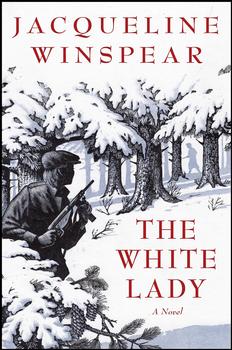Summary | Excerpt | Reviews | Beyond the book | Read-Alikes | Genres & Themes | Author Bio

An Unlikely Spy is not an action-packed spy thriller. Instead, it's a long-game, character-based work of espionage. Rebecca Starford's debut novel is a near-masterpiece, combining impeccable historical detail with John le Carré-esque tension and intrigue.
The story, mostly set in London during 1939 and 1940, closely follows the actual life of an inadvertent female MI5 spy (see Beyond the Book). The protagonist is working-class Evelyn Varley. We follow Evelyn's foray into high society, beginning with a scholarship to an elite boarding school, where she quickly learns how to blend into unfamiliar situations. Importantly, Evelyn also becomes good friends with Sally, who comes from an extraordinarily wealthy and networked family. Sally's family is smitten with Evelyn and they take her in, treating her almost like another daughter.
Enter Julia, Sally's troubled older sister. Julia is the black sheep of the family. She had a romance with a German, Hans, but has come back to England under mysterious circumstances after falling out with her lover. Evelyn soon befriends Julia as well, becoming, in many ways, closer to her than she is to Sally. Evelyn feels a bit guilty about this, which is par for the course for her character. She leads a life of guilt.
Without divulging too much of the plot, Evelyn secures a job at the War Office at the outbreak of WWII, and having studied German at Oxford, is quickly recruited into MI5 — Britain's domestic counter-intelligence and security agency. She is tasked with infiltrating a network of British citizens that secretly support the Nazis and wish to see a fascist takeover of Britain. Evelyn is well suited to this work, as she has been a chameleon since blending in at boarding school.
An Unlikely Spy plays with time as well. It starts in March 1948, but most of the book takes place between 1939-1940 in pre-war and early-war London. In 1948, Evelyn is distressed, but we don't know why. As the story from 1939-1940 unfolds, occasionally returning to 1948, we begin to learn the reason. A big reveal near the end of the novel in 1940 leads smoothly into the ending in 1948 and highlights Evelyn's growth as a person.
Starford is a masterful period-piece writer. She layers intricate details into her story, transporting the reader to the time and place. The book might have been 30% shorter without such ornate description, but it would have been 10 times less captivating. Starford excels at finding the right balance between detail and suspense-building.
Mixed in with great historic detail is an exquisite character study. Evelyn is complex, occasionally anxious and constantly guilt-ridden. She uses her likability to infiltrate people's lives and gain trust. She is put in the awkward position of working for the government as a "Talented Mr. Ripley," but Evelyn has empathy and heart, unlike the title character of that series. The ending is a triumph. Evelyn is forced to choose one or the other — for King and Country or friends and family.
An Unlikely Spy is a real page-turner. Like a classic Hollywood film, it takes its time to unfold and rewards the reader's patience with depth. The first third establishes characters and relationships. The middle is lent to MI5 intrigue. The last third crescendos with action, suspense and gut-wrenching plot twists. It is a layered and remarkable first effort from a writer to watch.
![]() This review was originally published in The BookBrowse Review in August 2021, and has been updated for the
April 2022 edition.
Click here to go to this issue.
This review was originally published in The BookBrowse Review in August 2021, and has been updated for the
April 2022 edition.
Click here to go to this issue.

If you liked An Unlikely Spy, try these:

by Ronald Drabkin
Published 2025
In the spirit of Ben Macintyre's greatest spy nonfiction, the truly unbelievable and untold story of Frederick Rutland—a debonair British WWI hero, flying ace, fixture of Los Angeles society, and friend of Golden Age Hollywood stars—who flipped to become a spy for Japan in the lead-up to the attack on Pearl Harbor.

by Jacqueline Winspear
Published 2024
The White Lady introduces yet another extraordinary heroine from Jacqueline Winspear, creator of the best-selling Maisie Dobbs series. This heart-stopping novel, set in Post WWII Britain in 1947, follows the coming of age and maturity of former wartime operative Elinor White—veteran of two wars, trained killer, protective of her anonymity&#...
These are not books, lumps of lifeless paper, but minds alive on the shelves
Click Here to find out who said this, as well as discovering other famous literary quotes!
Your guide toexceptional books
BookBrowse seeks out and recommends the best in contemporary fiction and nonfiction—books that not only engage and entertain but also deepen our understanding of ourselves and the world around us.